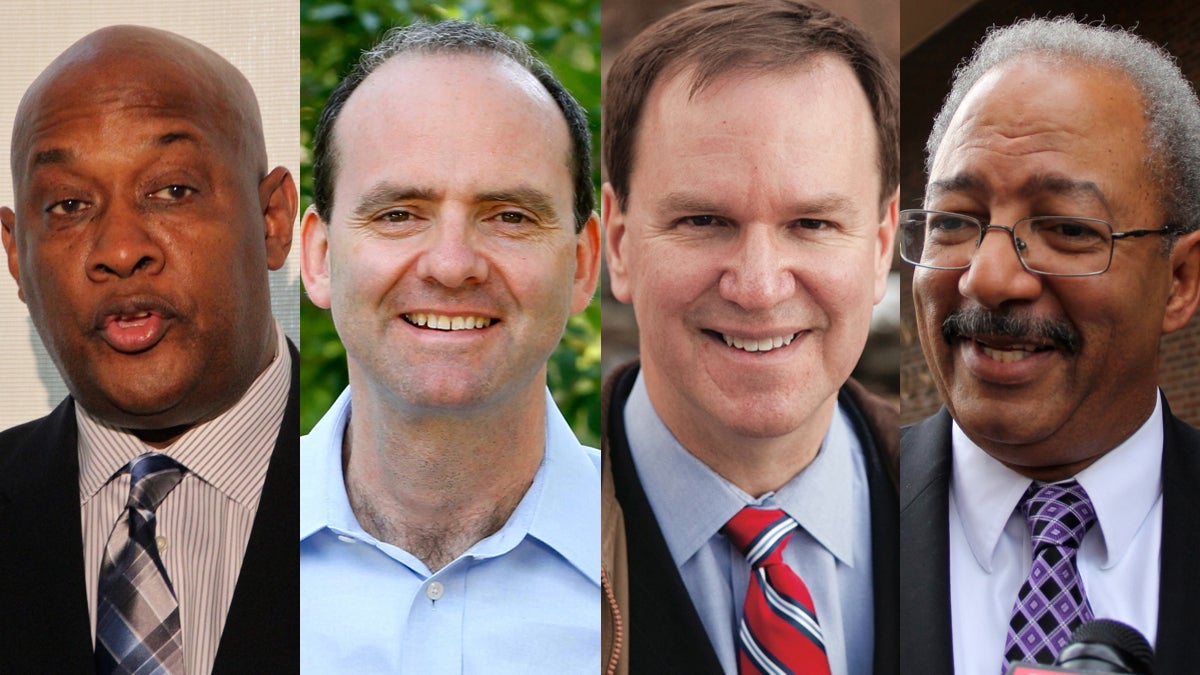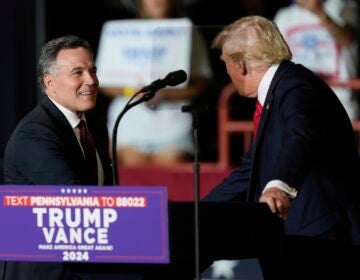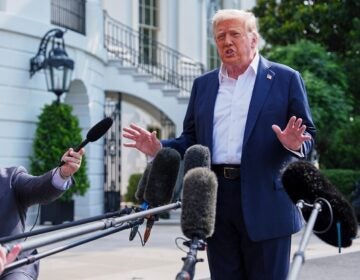Evans poses toughest challenge to Fattah’s re-election bid
Listen
Contenders in the Democratic primary for the 2nd Congressional District seat are
Philadelphia U.S. Rep. Chaka Fattah could very well win re-election while battling corruption charges. He has incumbency and a two-decade track record on his side. But if anyone can derail him, it’s probably state Rep. Dwight Evans.
Evans, 61, is best known among the three challengers who’ve filed to run against Fattah in the April 26 Democratic primary.
He’s spent nearly four decades in Harrisburg, held a powerful post on the House Appropriations Committee, and been a policy leader on crime and public education.
Evans has also run for higher office, though always unsuccessfully. He’s run for governor, lieutenant governor and twice for mayor of Philadelphia, most recently in 2007.
This year, it’s Congress or nothing for Evans. He isn’t seeking re-election in his legislative district.
“I was ready to move onto something else,” said Evans after addressing members of The Universal Muslim Business Association inside a West Oak Lane mosque.
“I’ve been there for 36 years. I now feel like I want to take what I’ve learned in Harrisburg and do it throughout the 2nd Congressional District, do it through the nation.”
‘Block by block’
Evans, who insists Fattah’s federal indictment didn’t spur his run, wants to put cities on the national agenda. He’s particularly interested in applying his approach of improving neighborhoods “block by block.”
To illustrate, Evans often points to West Oak Lane, which sits at the heart of his legislative district. Over the years, he’s steered millions in state and foundation funding to the Northwest Philadelphia neighborhood in the name of community revitalization — community revitalization that’s widely applauded.
Grant money has often gone to the Ogontz Avenue Revitalization Corporation, a nonprofit Evans founded in 1983. The organization has used it to transform its namesake commercial strip and, for nearly a decade, help pay for the West Oak Lane Jazz Festival.
The three-day music fete ended in 2011 after Pennsylvania’s Department of Community & Economic Development eliminated its state funding.
“I changed that entire neighborhood — commercial corridor, school, public safety, economic development. I’ve used my neighborhood like a laboratory,” said Evans in an interview.
As part of his platform, Evans said he would focus on issues that contribute to the deep poverty that exists in many communities across the 2nd Congressional District, which includes parts of Northwest, West and North Philadelphia, as well as most of Lower Merion Township in Montgomery County.
He said he’d work on creating jobs, raising the minimum wage, improving public education, and transportation.
“We have to make sure that they are inclusive in terms of this growth. This growth and prosperity cannot just be one section and not the entire city,” said Evans.
The elephant in the room
One thing Evans isn’t talking about is Fattah’s indictment. He said it’s a “legal matter that will have to be decided by the courts,” and voters should decide based on who they think has the right skills to make a difference.
“I have experience, I’ve been around, I’ve dealt with a lot of people in neighborhoods all across the city of Philadelphia, all across this nation,” said Evans.
The other two Democrats in the race, Philadelphia ward leader Dan Muroff and Lower Merion Township Commissioner Brian Gordon are also steering clear of the proverbial elephant in the room.
Still, Fattah knows why he has the first primary challenge since being elected to Congress in 1994.
“It’s just clear that the only reason there’s a contest is that there’s a belief that somehow the voters of my district are going to make a judgment about allegations that I say are frivolous, and I guess someone else wants to put more import to it,” said Fattah.
A dizzying 85-page indictment charges Fattah and four associates with racketeering, bribery, wire fraud and other offenses for allegedly misusing hundreds of thousands of dollars in campaign contributions, public funds, and charitable donations.
In the alleged scheme at the heart of the case, Fattah is accused of using a pair of nonprofits he founded to help repay part of an illegal $1 million loan he obtained to assist his unsuccessful 2007 mayoral campaign.
Fattah maintains his innocence. His trial is scheduled to start May 2, six days after the primary that will effectively elect the district’s next congressman.
Offense and defense
Roughly 80 percent of registered voters in the congressional district are Democrats. Many will stick with Fattah, said political consultant Mark Nevins.
“People are used to voting for him, and he has brought a lot of benefit to that district over the years,” said Nevins.
“If they’re not paying attention to what’s happening in the news media, which is his hope, then people will go to the polls on Election Day and they’ll say, ‘Oh, Congressman Fattah. I always vote for him. I’ll vote for him again.'”
Nevins said Fattah’s legal problems might come into play if the race is tight down the stretch, though it could be a risky move for Evans to bring them up. While Evans has never been indicted, he’s certainly drawn scrutiny from government watchdogs.
“If [Evans] chooses to go on the attack against Congressman Fattah, Congressman Fattah could return the favor and say, ‘Is this guy really going to try and lecture me on ethics?'” said Nevins.
In 2013, the OARC, the development agency Evans founded, agreed to return $1.2 million in public money, withdraw four grant requests, and undergo stricter spending controls following a state probe into allegations of financial mismanagement.
Evans has called the investigation, which found no wrongdoing, a case of “political profiling.”
Two years earlier, Philadelphia’s chief integrity officer released a report raising questions about what one school district official called a “godfather” style private agreement struck between Evans and then-School Reform Commission Chairman Robert Archie over which charter school operator would run Martin Luther King Jr. High School.
After parents chose, and the SRC approved, Mosaica Turnaround Partners to operate King, Evans and Archie met with the company’s president with hopes of convincing him to back out.
He did. Foundations Inc., a company with which Evans had a longstanding relationship, was then selected to run the East Germantown school, but later walked away amid the controversy that arose after the Mosaica meeting came to light in the media.
A path to victory?
Evans may not need to sling mud, though. He’ll likely have a lot more money than Fattah to get his message out.
As of Dec. 31, the last filing, Evans had more than $300,000 on hand in his campaign fund. Fattah had less than $8,000 and considerable legal debt.
Evans’ fundraising lead and name recognition, coupled with noteworthy endorsements from Philadelphia Mayor Jim Kenney, Pennsylvania Gov. Tom Wolf and former Gov. Ed Rendell could be enough for him to win.
And yet, this is Philadelphia, and Fattah knows being down doesn’t mean you’re out.
“It’s a rejoiceful moment. What we can do now, is we can have the voters of the district ratify the work that I’m doing and authenticate the fact that I’m representing their interests in Washington,” said Fattah.
To date, the only poll released about the race was one commissioned by Evans’ campaign before state Rep. Brian Sims’ made an exit in mid-February.
It showed Evans with a double-digit lead over Fattah — 37 percent to Fattah’s 21 percent.
WHYY is your source for fact-based, in-depth journalism and information. As a nonprofit organization, we rely on financial support from readers like you. Please give today.





